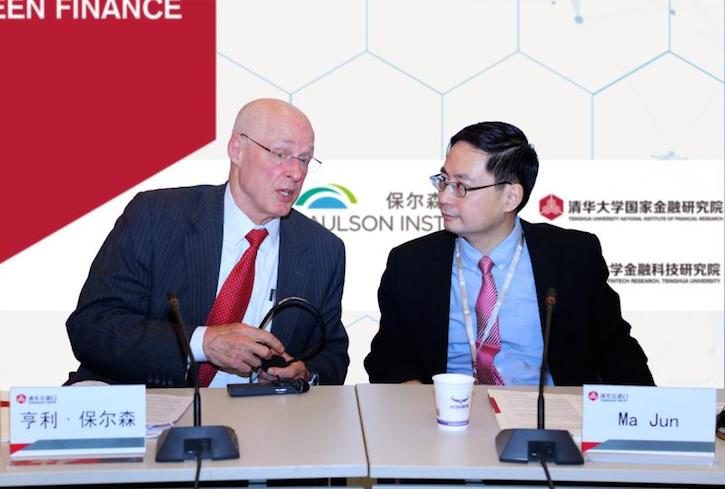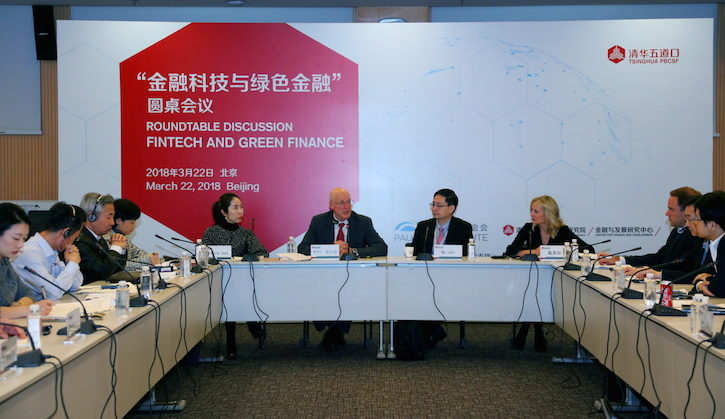
China has the world’s largest and fastest growing market globally for fintech. This growth of giants like Ant Financial and Tencent in this space are transforming the traditional financial industry. Fintech is increasingly becoming the norm and is now imbedded into today’s global financial system. Just as fintech has been transformational in the traditional financial sector, it can—and should—play the same role in the development of green finance.
The Paulson Institute co-hosted a roundtable discussion on fintech and green finance with the Center for Finance and Development at Tsinghua University’s National Institute of Financial Research on March 22, 2018 in Beijing. This was the third in a series of high-level roundtable discussions on green finance. It brought together leading experts to explore development of this fast-paced sector and its intersection with sustainability.
The focus of the discussions centered on the growing global fintech trend, the best applications of fintech to facilitate green finance development, and necessity for tailored and creative government guidance of fintech to promote sustainable development. Participants were vocal and substantive in their opinions on how fintech can fuel green finance development in small and medium-sized enterprises (SMEs) who have little access to green finance and how fintech can enable the growth of green finance in more efficient and effective ways. SMEs are important in this context as they are the drivers of economic growth. If they can be encouraged or incentivized to be “green” in their operations, it would be as though deploying a small but powerful army in the battle against pollution.

In recognition of the growing role that fintech can play in achieving sustainability goals, it has been included as one of the three topics of this year’s G20 Sustainable Finance Study Group (SFSG) in 2018. This roundtable discussion will contribute to the SFSG body of work and conversation.
A number of key issues and policy suggestions were raised during the roundtable:
- Strike a balance between the advantages of fintech innovation and regulatory oversight. While the opportunities presented by fintech are significant, it is important for both international financial regulators and national governments to address the governance and financial risk concerns that accompany the fintech revolution. It is a challenge to ensure a transparent and competitive financial market that protects consumers and investors from fraud when new products outpace regulatory oversight. It is an imperative to create an effective and balanced policy and regulatory framework to both support the promotion of fintech while addressing the inherent risks associated with digital transformation.
- Enhance green identification capacity. In a green financial system, it is necessary to establish a standardized and efficient identification system – or a commonly accepted definition of “green” to enhance the confidence of investors in green finance. Fintech can be leveraged to enhance the capacity to identify “greenness” that would help to avoid issues such as “green washing” or claiming products are green when it is not the case. One particular fintech application is in the green rating and credit evaluation through the use of big data. There is current research focused on developing a model of “smart auditing + smart contracts” that would integrate big data from audit reports, credit reports, energy consumption data and environment impact assessment reports of SMEs with artificial intelligence (AI) to evaluate the “greenness” of SMEs.
- Establish a green credit system for SMEs. SMEs in China routinely face the limited availability and high cost of obtaining financing. Due to limited information disclosure requirements, it is even more difficult to identify “green” SMEs and therefore provide loans for those that qualify. Fintech could be leveraged to break the asymmetry of green financial information of SMEs and a first step could be easier to create a green credit negative list for SMEs with clear instructions for what kinds of projects are definitely not green for financing. It would then be followed by a positive list that would clarify the types of green projects eligible for SMEs low-cost financing. Based on development of the green credit negative and positive lists, a green credit system for SMEs is expected to be established in banking system with application of fintech.
- Unlock small and medium-sized green project opportunities. Fintech could help match capital with green development goals and enhance its impact in the financial system. The IOT could automatically collect and transfer data, for example, and when traced and registered with blockchain could form green asset information service platforms. With such platforms, green assets can be packaged together and distributed as energy green asset-backed securities (ABS). This helps to expand financing channels for small and medium green projects and long tail assets with large market share and distribution channel, reduce financing costs, and attract the potential investments from the mainstream capital market.
- Expand environmental information disclosure requirements. Environmental information disclosure is fundamental to the issue of green finance. China is beginning to require greater disclosure of environmental information from listed companies and financial institutions to improve transparency and provide strong support for the establishment of a sound green financial system. Despite these efforts, access to environmental information of SMEs remains a significant challenge. Big data could be used to alleviate some of these concerns by leveraging the environmental information disclosure more efficiently and more applicable to SMEs.
- Promote cross-ministry information sharing mechanism. Information asymmetry represents one of the major obstacles in developing green finance. Previously, China has explored information sharing between the Ministry of Environmental Protection (MEP) and the Credit Reference Center (CRC) of the People’s Bank of China (PBoC) with an agreement signed between the two agencies. As China undergoes institutional changes, the government should continue to encourage information sharing between ministries and regulators, for instance, the information on ecological environment and carbon emission. Big data innovations are ideal for creating such an information sharing mechanism.
- Strengthen capacity building and public awareness. The effort to integrate fintech and green finance will require research, exchange, and capacity building on an international and national level. As a partner of the G20 SFSG, the Sustainable Digital Finance Alliance (SDFA)—a joint effort of the UNEP and Ant Financial—is committed to leading the international coordination on fintech and sustainable development. The SDFA is a platform for research, learning and cooperation to share best practices and examples, set up seed funds, launch startup competitions and explore new business models. As part of China’s effort to enhance national public awareness, Xiong’an New District is contemplating a proposal for personal carbon accounts, which would leverage fintech to promote the green development of communities.
The event convened senior-level experts and specialists from a wide spectrum of organizations interested in green finance. Representatives from UNEP Sustainable Digital Finance Alliance, Postal Savings Bank of China, VISA, China Foundation for Poverty Alleviation (CFPA) Microfinance, China Industrial Bank, Shenzhen Internet Finance Association, Stanford University, the Energy Foundation, CSRC Research Institute, International Institute of Green Finance of Central University of Finance and Economics, Chongyang Institute for Financial Studies of Renmin University of China, British Embassy Beijing, SEB Beijing Office and Onlyou participated in the roundtable.



